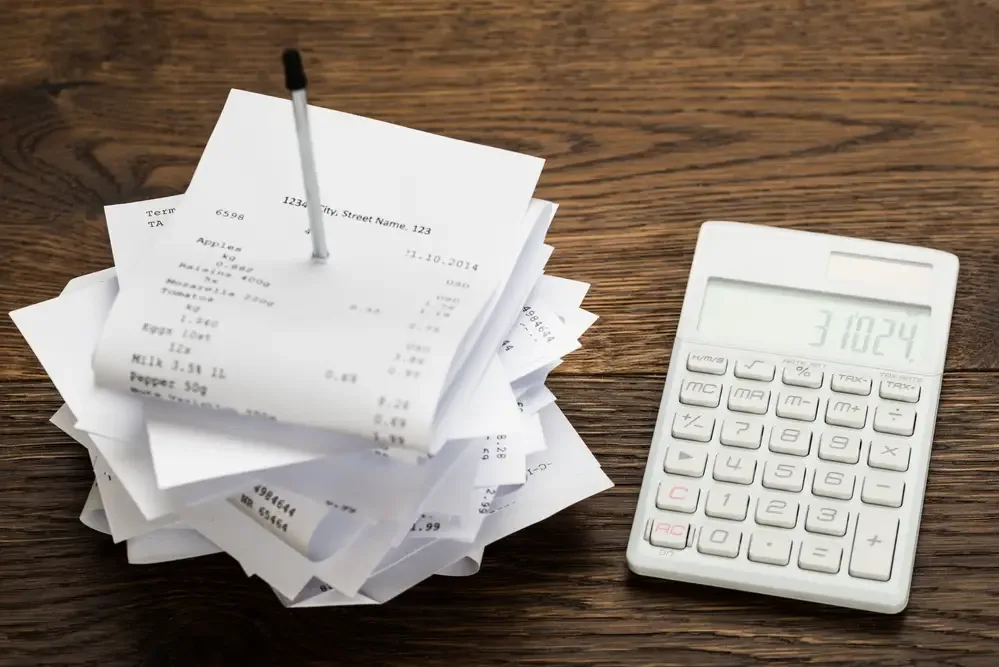Filing your taxes as a digital nomad can feel daunting. But don’t let taxes stop you from living an incredibly rewarding lifestyle. In this article, we’ll help you navigate digital nomad taxes and share everything you need to know.

We have experience filing taxes as digital nomads in the US and the UK, so the information below will be based on that. That said, most of this information is for any digital nomad worldwide, so we think you’ll find this helpful no matter where you’re filing taxes.
Do Digital Nomads Pay Taxes?
Yes, if you make more than the minimum amount required to file, you must file federal and state taxes.
The specific taxes freelancers and digital nomads are required to pay will depend on the country or countries where they earn income, as well as their residency status and tax obligations in those countries.
- US citizens can find minimum filing requirements here.
- UK citizens can find minimum filing requirements here.
If you’re from another country, then a quick Google search of a reliable source should provide you with similar information.
While digital nomad taxes can be confusing, a simple way to understand what you’ll pay is:
- If you only travel a portion of the year, you’ll more than likely pay taxes as you normally would.
- If you’re out of your home country for most of the year, you’ll need to do further research to determine which taxes (federal, state, and/or social security taxes) you’ll pay and for what country.
Note: The above information is for freelancers or business owners. If you’re a remote employee who works for a company, you’ll file your W-9 (or the tax document of your home country) as you would if you were working on-site.
It’s important for digital nomads to understand their tax obligations and to ensure that they are in compliance with tax laws in all countries where they earn income.
Read More: How to Live Cheaply as a Digital Nomad (10 Must-Know Tips)
How to File Digital Nomad Taxes
We know how stressful it can be to figure out how to file your taxes as a digital nomad. But when you understand what you need to do and what helpful resources you can use, it’s easier than it seems. And after a year or two of filing your taxes as a digital nomad, it’ll become almost second nature.
To file your taxes, you’ll need to:
- Understand what country you’ll file taxes for
- Know when taxes are due
- Determine your business structure
- Understand what income to claim
- Have a record of income and expenses
- Get your documents ready
Understand What Country You’ll File Taxes For
Where you file and pay your taxes depends on various factors. That said, where you spend most of the year living is typically what’s most important.
Of course, if you’re a digital nomad who spends most of your time in your home country, that’s where you’ll pay your digital nomad taxes. You may also need to file federal taxes in your home country, even if you’re travelling a lot.
You can learn more by visiting revenue service sites for the country you’re from and/or living in. Find those here. For more help, you can consult an accountant.
Know When Taxes Are Due
Deadlines for filing and paying your taxes vary depending on where you’re from.
In the US, the tax year is from 1st January – 31st December, and you must file and pay all taxes by mid-April. In 2023, tax day is the 18th April. This is when you must have your 2022 taxes filed and paid.
In the UK, the tax year falls from 6th April through 5th April of the following year. Then, taxes are due by 31st January.
You may be responsible for paying a fine if you’re late on your taxes. While filing and paying taxes is a requirement, and it’s illegal not to, it’s not unheard of for people to miss deadlines. If you’re in this position, speak to an accountant to learn what you need to do regarding your payment and fine.
Read More: 15 Best Finance YouTube Channels (Meet Your Personal Finance Goals)
Determine Your Business Structure
You’ll need to determine your business structure to ensure you file appropriately and have proper documents.
As we mentioned above, if you’re a digital nomad who works remotely as an employee for a company, you’ll still get a W-9 or the tax document of your country.
If you’re a freelancer or business owner, determine if your business is an LLC or sole proprietorship. Most nomads who freelance are sole proprietors by default.
We’ll share more information on documents for digital nomad taxes below.
Understand What Income to Claim
If you work for yourself (you’re not a remote employee for a company), you must report any source of income you earn.
Whether you provide a service, sell digital or physical products, earn money from affiliate marketing, or any other way that you make earnings, you’re responsible for claiming this as income.
Have a Record of Income & Expenses
To file taxes as a digital nomad, we highly recommend keeping your income and expenses organized throughout the year.
If it’s time to file taxes and you haven’t kept records, that’s okay. You’ll just need to backtrack and document how much you earned the past tax year and what you spent on business expenses.
Get Your Documents Ready
When it’s time to file and pay digital nomad taxes, you’ll need to have documents. This is when you’ll need to know the structure of your business, as we discussed above.
If you’re filing taxes for the US or UK, you can learn more about specific documents you’ll need here:
- How to Submit Your Tax Return for Freelancers in the US
- How to Submit your Self-Assessment Freelance Tax Return UK: A Guide
Tax Tips for Digital Nomads
Here are a few more helpful tips for self-employed nomads for understanding, keeping up with, filing, and paying your digital nomad taxes.

- Use a Google folder or something similar to organize your tax information and documents, like receipts for expenses, invoices, and bank interest summaries. Doing this throughout the year will make things easier when it’s time to file your taxes. Keep these for six years minimum. I have a folder for each tax year to make this simpler.
- Have a bank account that’s dedicated to business expenses only. This helps sort and track your business earnings and costs. Many banks are geared towards digital nomads and freelancers.
- File your taxes as soon as possible to give yourself as much time as possible to pay your taxes.
- Set aside a percentage of your monthly income in a separate account to save for your tax payment. Note: In the US, most digital nomads pay quarterly taxes to avoid one lump-sum payment at tax time.
- Check out these budgeting apps to help you budget your money and save for taxes.
- Use an accounting service to help you file your taxes and ask questions if needed. Some of our favourites are Sage, H & R Block Self-Employed, and QuickBooks.
Digital Nomads Tax Deductions: A Quick Checklist
Digital nomads often wonder what expenses they can write off or deduct. It’s important to write off any expenses possible, as this helps you save money on your tax payment. by reducing your taxable income.
The specific expenses that you can claim will vary based on your location, industry, and type of work but, in short, anything you pay for that you use for your business is typically a deduction.
These expanses can include:
- Office space (rent, coworking space, etc.) & office supplies and equipment. You may be able to claim a portion of your rent or mortgage, utilities, insurance, and other related expenses as a home office deduction
- Clothes required for work
- Professional development expenses such as courses, training, conferences, and educational material related to your work
- Payments made to employees or other freelancers who work for you
- Travel expenses for business-based travel, including lodging, and meals
- Advertising and marketing expenses, such as branding, your website, etc.
- Fees for business software and apps
- The cost of insurance premiums that are related to your business such as liability insurance
- All or a portion of your phone and internet bill, if used for your business
- Expenses related to marketing and advertising your services, such as business cards, brochures, and website fees
Tip: You can learn more about expenses and budgeting in some of our favourite personal finance books.
Digital Nomad Taxes FAQs
As digital nomads, it’s important to stay informed about tax requirements and obligations while on the move. Whether you are just starting out as a digital nomad or have been on the road for a while, here are answers to some of the most some common questions about taxes for digital nomads.

What Are The Best Tax-Friendly Countries for Digital Nomads?
There is no one-size-fits-all answer when it comes to the best tax-friendly countries for digital nomads, as tax laws and regulations can vary widely depending on the country.
However, there are several countries that are often cited as being particularly attractive for digital nomads in terms of taxes. Several countries welcome digital nomads and offer low tax rates to attract more tourists. These include Spain, Georgia, Costa Rica, and Croatia, all of which are lovely destinations for travellers and remote workers.
Do Digital Nomads Have Any Tax Exclusions or Deductions?
Many digital nomads do have tax exclusions that can help lower their tax bills and avoid double taxation (multiple payments on the same source of income).
For example, American digital nomads can get an exemption if they pass the Bona Fide Residence Test or the Physical Presence Test. More on that here.
Do You Have to Pay Taxes on Foreign Earned Income?
Yes, you usually have to pay taxes on foreign-earned income. Again, this depends on how much you make, where you’re from, and how much time you spend out of the country.
We can vouch for US and UK citizens being responsible for paying taxes on foreign-earned income.
That said, if you’re a freelancer or business owner and most of your clients share the same residency as you, you won’t worry about foreign-earned income.
What Happens if Digital Nomads Don’t Pay Their Taxes?
There are penalties for not paying your digital nomad taxes. Typically, if you’re late, there’s a late payment penalty. There’s also the possibility of seized property and/or assets if you ignore payment altogether.
Visit your country’s revenue website or contact an accountant to discuss and set up a payment plan if you have unpaid taxes.
Can Digital Nomads Catch Up on Taxes Without Penalties?
It’s possible to catch up on taxes without penalties, depending on your circumstance. Again, working with an accountant is best if you’re in this situation as they can advise you on the best way to proceed.
There are many accountants who specialize in working with freelancers and small business owners.
Digital nomad taxes don’t have to be so stressful, and we hope you found this article helpful. If so, please consider sharing with someone else who might be interested in learning about taxes for digital nomads.
Read More:
A Complete Guide to Healthcare for Freelancers in the US
How to Apply for a Digital Nomad Visa: A Complete Guide
7 Ways Digital Nomads Make Money Online
How to Avoid Debt as a Digital Nomad (+ Debt Management Tips)

